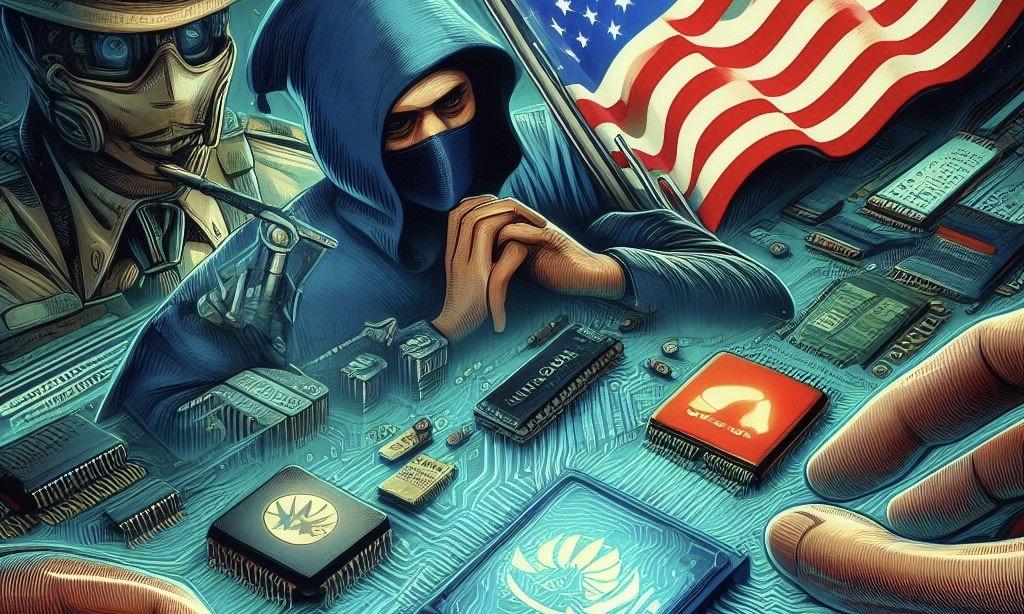In a significant escalation of trade restrictions, the United States has revoked licenses from leading semiconductor manufacturers Intel Corp. and Qualcomm Inc., obstructing Huawei Technologies Co.'s access to vital chip supplies, sources familiar with the matter revealed.
Impact on Chip Sales to Huawei
The US has canceled Huawei Technologies Co.'s licenses to buy semiconductors from Qualcomm Inc. and Intel Corp., increasing export restrictions on the Chinese telecom equipment maker, a new report claimed.
According to people who spoke on the condition of anonymity, the withdrawal of licenses has impacted US sales of semiconductors used in Huawei phones and laptops. Michael McCaul, chairman of the House Foreign Affairs Committee, confirmed the administration's decision in an interview Tuesday, as per Bloomberg (via Yahoo Finance). He believes the action is critical to keeping China from creating advanced AI.
“It’s blocking any chips sold to Huawei. Those are two companies we’ve always worried about being a little too close to China,” McCaul, a Texas Republican who was briefed about the license decisions for Intel and Qualcomm, said.
While the decision may not affect many chips, it demonstrates the US government's desire to limit China's access to a wide range of semiconductor technologies. Officials are also mulling sanctions against six Chinese corporations suspected of supplying chips to Huawei, which has been on the US trade restrictions list since 2019.
The US Commerce Department confirmed the withdrawal of "certain licenses" for Huawei's exports but declined to provide specifics. Following signs of progress in the country's semiconductor development, the Democratic administration has faced increased pressure to do more to deter Huawei and other Chinese tech businesses.
“We continuously assess how our controls can best protect our national security and foreign policy interests,” the agency said in a statement Tuesday.
Qualcomm shares fell 0.9% to $180.15 on Tuesday, following a Financial Times report earlier in the day on the license revocation. Intel's stock changed slightly, trading at $30.68.
Qualcomm recently stated that its partnership with Huawei is already constrained and will soon end. Qualcomm has been permitted to supply the Chinese company with processors that support earlier 4G network connections, but it is forbidden to sell ones that provide more advanced 5G access.
“This is small. Qualcomm has already said that the Huawei business is going away anyway,” Stacy Rasgon, an analyst at Sanford C. Bernstein, stated.
According to Bloomberg's supply chain research, Huawei is not one of Qualcomm's top ten customers. It also does not appear on Intel's list of top clients.
Rasgon points out that Huawei only ships roughly five million desktop and notebook computers each year, accounting for 2% of the market, so even if Intel supplied all of the chips, the impact on Intel's profitability would be small.
Impact on Chip Sales to Huawei
The US is pressuring allies such as Japan, the Netherlands, South Korea, and Germany to tighten restrictions on selling and maintaining chip fabrication gear in China, with Huawei the primary target of that effort.
McCaul and other Republican politicians, including House Republican Conference Chairwoman Elise Stefanik and Senator Marco Rubio, have called Commerce to withdraw licenses for companies that sell chips to Huawei. Their complaints intensified after the business launched a smartphone powered by an advanced, made-in-China CPU while Commerce Secretary Gina Raimondo was in China in August.
The Biden administration has launched an investigation into the "purported" 7-nanometer device, which a Bloomberg breakdown revealed was manufactured by Chinese chipmaker Semiconductor Manufacturing International Corp. A Commerce official claimed earlier this year that SMIC may have broken US law by supplying that semiconductor to Huawei.
Photo: Microsoft Bing



 SoftBank Shares Slide After Arm Earnings Miss Fuels Tech Stock Sell-Off
SoftBank Shares Slide After Arm Earnings Miss Fuels Tech Stock Sell-Off  Sam Altman Reaffirms OpenAI’s Long-Term Commitment to NVIDIA Amid Chip Report
Sam Altman Reaffirms OpenAI’s Long-Term Commitment to NVIDIA Amid Chip Report  Nvidia CEO Jensen Huang Says AI Investment Boom Is Just Beginning as NVDA Shares Surge
Nvidia CEO Jensen Huang Says AI Investment Boom Is Just Beginning as NVDA Shares Surge  Baidu Approves $5 Billion Share Buyback and Plans First-Ever Dividend in 2026
Baidu Approves $5 Billion Share Buyback and Plans First-Ever Dividend in 2026  SpaceX Reports $8 Billion Profit as IPO Plans and Starlink Growth Fuel Valuation Buzz
SpaceX Reports $8 Billion Profit as IPO Plans and Starlink Growth Fuel Valuation Buzz  SpaceX Updates Starlink Privacy Policy to Allow AI Training as xAI Merger Talks and IPO Loom
SpaceX Updates Starlink Privacy Policy to Allow AI Training as xAI Merger Talks and IPO Loom  SoftBank and Intel Partner to Develop Next-Generation Memory Chips for AI Data Centers
SoftBank and Intel Partner to Develop Next-Generation Memory Chips for AI Data Centers  Nintendo Shares Slide After Earnings Miss Raises Switch 2 Margin Concerns
Nintendo Shares Slide After Earnings Miss Raises Switch 2 Margin Concerns  Oracle Plans $45–$50 Billion Funding Push in 2026 to Expand Cloud and AI Infrastructure
Oracle Plans $45–$50 Billion Funding Push in 2026 to Expand Cloud and AI Infrastructure  SpaceX Prioritizes Moon Mission Before Mars as Starship Development Accelerates
SpaceX Prioritizes Moon Mission Before Mars as Starship Development Accelerates  Elon Musk’s Empire: SpaceX, Tesla, and xAI Merger Talks Spark Investor Debate
Elon Musk’s Empire: SpaceX, Tesla, and xAI Merger Talks Spark Investor Debate  Global PC Makers Eye Chinese Memory Chip Suppliers Amid Ongoing Supply Crunch
Global PC Makers Eye Chinese Memory Chip Suppliers Amid Ongoing Supply Crunch  Sony Q3 Profit Jumps on Gaming and Image Sensors, Full-Year Outlook Raised
Sony Q3 Profit Jumps on Gaming and Image Sensors, Full-Year Outlook Raised  Instagram Outage Disrupts Thousands of U.S. Users
Instagram Outage Disrupts Thousands of U.S. Users  AMD Shares Slide Despite Earnings Beat as Cautious Revenue Outlook Weighs on Stock
AMD Shares Slide Despite Earnings Beat as Cautious Revenue Outlook Weighs on Stock 
































